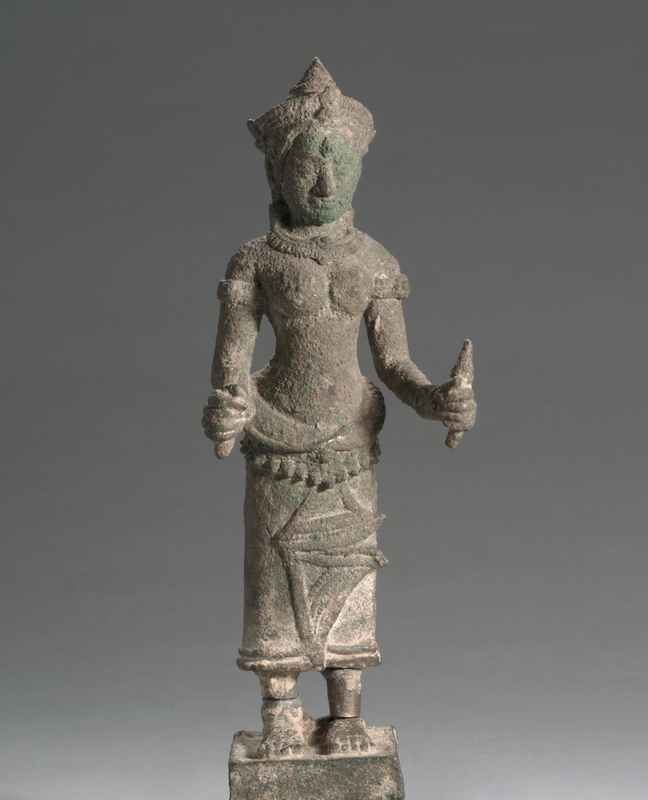Mildred Howard's Work
This bronze sculpture of Prajnaparamita was created at some point during the thirteenth to fifteenth centuries in the Khmer style. Images of Prajnaparamita began to proliferate during the rule of Jayavarman VII (c. 1181-1218), who made Buddhism the state religion of the Khmer Empire. Worship was focused on a triad consisting of the naga-protected Buddha flanked by the bodhisattva Avalokitesvara, and the goddess of wisdom, Prajnaparamita. Buddhahood was believed to be the result of Avalokitesvara’s compassion in combination with wisdom, or the proper understanding of the nature of reality. Jayavarman memorialized his father as Avalokitesvara and his mother as Prajnaparamita, thereby casting himself as the human counterpart to the Buddha. In this sculpture, Prajnaparamita’s wisdom is symbolized through the items she holds: a book and a lotus bud. By situating his parents in relation to these sacred beings, Jayavarman both legitimized his own rule and cemented the significance of his family.
Griswold too cultivated close relations with his kin, both biological and chosen. His correspondence with friends and colleagues like Gordon H. Luce spans decades; their letters are filled with warmth and personal tidbits amidst professional discussions of publication plans and musings on difficult translations. Griswold reports on his long walks, invigorating swims, and seasonal changes at Breezewood. “We are getting lots of flowers from the garden, as well as some tomatoes and a few other vegetables. The stream is full of watercress.” Every year, Luce makes sure that Griswold has purchased a Christmas gift from him for “Mrs. Howard.” In December 1972, Griswold informs him,
My dear Gordon,
Mrs. Howard says it will be better to get her Christmas present after Christmas, as the shops are so crowded at present. I am asking her to select it, as my ability to choose suitable presents for ladies is very limited. Don’t feel alarmed that it will be overlooked; I promise you and Tee Tee [Ma Tee Tee, who was married to Luce] that I will use force if necessary.
In a September 1972 missive, Luce requests,
Dear Alex,
It seems that Mrs. Howard (that excellent lady) has just started typing my Pre-Standard Old Burmese Glossary. Please ask her to stop, pending arrival of two packets of papers I am posting by registered post today.
And in July 1976,
My dear Alex,
Many thanks for your welcome letter of June 25th, with its touching supplement by Mrs. Howard, whom I have never seen, but shall always regard affectionately as one of my kindest and most generous helpers (Griswold papers, #4290).
“Mrs. Howard,” or Mildred Howard, was Griswold’s secretary and assistant. She was a local Baltimorean and worked at Breezewood every weekday for over twenty years, at least since the early 1960s until the late 1980s. Mrs. Howard undertook essential but largely invisibilized work that is documented only in traces in Griswold’s letters, and that is also materialized in the form of the letters themselves, which she may have typed or filed. She was responsible for organizing Griswold’s notes and provenance information about each object in his collection; keeping track of his correspondences; helping with his finances; and assisting with his projects, like the manuscript Old Burma – Early Pagan that Luce was writing with the support of Griswold. Hiram Woodward remembers her as “cheerful” and hard-working, and one wonders what Mrs. Howard thought about, or how she related to, the interests and ideas of Griswold that she would have spent hundreds of hours compiling.
Alexander Griswold Papers, #4290. Division of Rare and Manuscript Collections, Cornell University Library.
Woodward, Hiram W. Personal interview. 11 January 2021.
Next:
